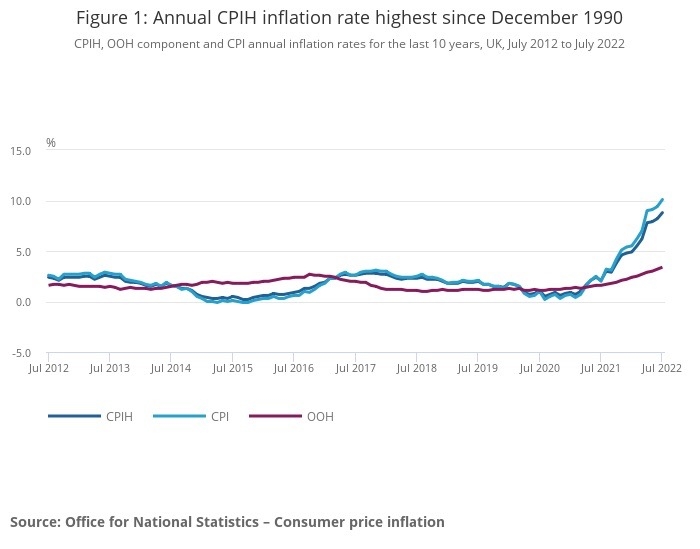CPI inflation jumped from 9.4% in June to 10.1% in July, the highest level seen since the early 1980s.
Rising prices for fuels and food were mainly to blame, according to ONS which released the figures this morning.
CPI rose by 0.6% in July compared to no change in July 2021.
The figures show a huge increased compared to 12 months ago. In July last year 12 month CPI inflation fell from 2.5% to 2%, rising to 3.2% in August 2021.
The Consumer Prices Index including owner occupiers' housing costs (CPIH) rose 8.8% in the 12 months to July 2022, up from 8.2% in June.
The older RPI measure of inflation - still used for many pension benchmarks - was 12.3% in July, up from 11.8% in June.
ONS, which produces the statistics, said that the biggest upward driver of the rise in CPI and CPIH was rising food prices.
Les Cameron, savings expert at M&G Wealth, said: “Rising inflation continues to attack consumers from all angles and shows no signs of easing off anytime soon.
“With sky-high energy bills as well as high food costs and petrol prices – which have risen by 39% between July 2021 and July 2022 according to data from the RAC - contributing to the cost-of-living crisis, many pensioners will struggle to maintain the same standard of living.
“Others spending considerable time at home, such as those now working from home, will also bear the brunt of the crisis. The other danger is increased inflation, without any increase in savings rates, means more people with cash savings, or near cash savings, such as National Savings & Investments, will see the continued erosion of their wealth in real terms."
Rob Clarry, investment strategist at Financial Planner and wealth manager Evelyn Partners, said: "In July UK CPI hit its highest level in 40 years. Unfortunately, it looks set to continue its march higher in the coming months.
"July’s increase was mainly driven by rising food costs. With changes to Ofgem’s price cap in October set to take the inflation rate to around 13%, these are challenging times for UK households. It’s clear that the UK economy faces significant headwinds, which could make life difficult for domestically focussed firms. As we know, the UK stock market derives most of its revenue from overseas, and we continue to advocate favouring those larger global businesses listed in London whilst being more selective in the mid and small cap space, particularly those that are focussed more on the UK economy."
Laura Suter, head of personal finance at AJ Bell, said: “The eye-watering increase in the price of food in July will be dismal reading for many families already struggling to pay for their supermarket shop. Food inflation reached 12.7% in July, having seen the highest monthly growth in more than 20 years. And there’s no option of hunting out food that hasn’t risen in price, as costs went up in every category the ONS records, with dairy, bread and cereals seeing the biggest uptick. We’ve seen swathes of shoppers switching to discount supermarkets or trading down from branded products to own brands, and that will accelerate as food prices continue their climb upwards."
• This is a developing story. Check back later for updates and further reaction.

